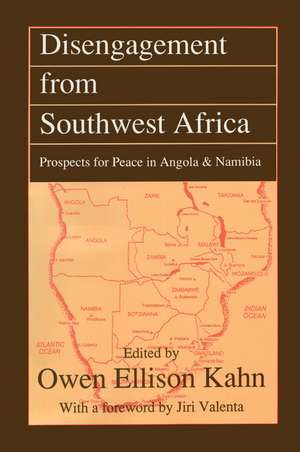Disengagement from Southwest Africa: Prospects for Peace in Angola and Namibia: The East-South Relations Series
Autor Owen Kahnen Limba Engleză Paperback – 18 dec 2020
In 1975, Soviet-Cuban assistance to the Leninist-oriented Movement for the Popular Liberation of Angola (MPLA) was the first extensive Soviet-allied military intervention in the Third World. While the Soviet-backed Cubans propped up the MPLA, the South Africans intervened, on a smaller scale, in support of the National Union for the Total Independence of Angola (UNITA) under Jonas Savimbi. After 1985 UNITA began receiving United States support, and a military stalemate ensued. The contributors to this volume analyse how the Soviet Union and the United States used this stalemate to move the MPLA, Cuba and South Africa to settle not only their differences, but also the vexing question of the Independence of Namibia.
Central issues explored are how and why South Africa and Cuba got into the Angolan arena, why they stayed so long, and why they saw fit to get out. While the authors differ on the forces at work, their debate is itself enlightening, and offers valuable insights into the policy options of regional powers. The contributors also review further steps, beyond military disengagement, needed to finally resolve the Angolan civil war, and ensure regional stability. They assess the potential for breakdown of the accords, and the likely consequences should this occur.
Disengagement from Southwest Africa will interest policymakers and researchers concerned with developments in southern Africa and Cuba, and with relations between the superpowers.
Preț: 260.72 lei
Preț vechi: 311.80 lei
-16% Nou
Puncte Express: 391
Preț estimativ în valută:
49.89€ • 52.27$ • 41.24£
49.89€ • 52.27$ • 41.24£
Carte tipărită la comandă
Livrare economică 11-25 aprilie
Preluare comenzi: 021 569.72.76
Specificații
ISBN-13: 9781138509245
ISBN-10: 1138509248
Pagini: 256
Dimensiuni: 152 x 229 mm
Greutate: 0.49 kg
Ediția:1
Editura: Taylor & Francis
Colecția Routledge
Seria The East-South Relations Series
Locul publicării:Oxford, United Kingdom
ISBN-10: 1138509248
Pagini: 256
Dimensiuni: 152 x 229 mm
Greutate: 0.49 kg
Ediția:1
Editura: Taylor & Francis
Colecția Routledge
Seria The East-South Relations Series
Locul publicării:Oxford, United Kingdom
Cuprins
I. THE USSR AND THE CONFLICT IN ANGOLA AND NAMIBIA 1. Gorbachev’s New Political Thinking and the Angola Conflict2. Gorbachev’s Policies on Southern Africa Colin Legum 3. Soviet Foreign Policy for Angola/Namibia in the 1980s: A Strategy of Coercive Diplomacy II. CUBA AND THE CONFLICT IN ANGOLA AND NAMIBIA 4. Cuba’s Role in Southern Africa: The Angola- Namibia Negotiations and the Future of Superpower Conflict in the RegionIII. SOUTH AFRICA AND THE CONFLICT IN ANGOLA AND NAMIBIA 5. South Africa and the 1988 Agreements6. Retrenchment and Recalculation: South Africa and the Angola-Namibia Agreements IV. ANGOLA AND NAMIBIA BETWEEN EAST AND WEST 7. The Angola/Namibia Agreements: Likely Results and Policy Implications8. The Namibia-Angola Settlement and the Future of U.S.-Soviet Competition in the Third World V. CONCLUSION 9. Perceptions and Peace Appendix A: UNLIKELY DIALOGUE: SOVIET AND UNITA VIEWS ON THE CONFLICT I. Soviet Attitudes Toward Southern Africa II. UNITA’s Role in Angola
Notă biografică
Owen Kahn, volume editor, is assistant professor of political science at the Graduate School of International Studies, the University of Miami. Born in South Africa, he received an M.A. from Oxford University and a Ph.D. from the University of California at Berkeley.
Descriere
Gorbachev's new thinking on superpower relations assumes that struggle between two opposing world systems no longer characterizes the present era. This second volume in the East-South Relations series explores the implications of Gorbachev's new thinking for regional conflicts.

